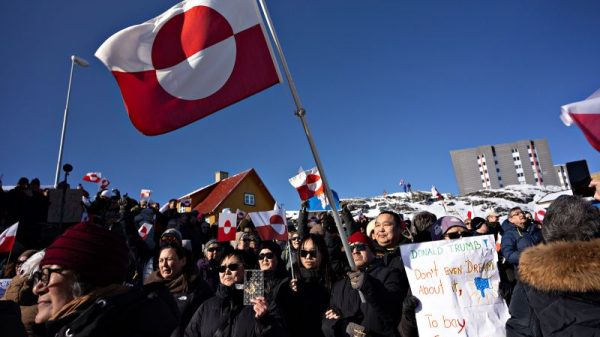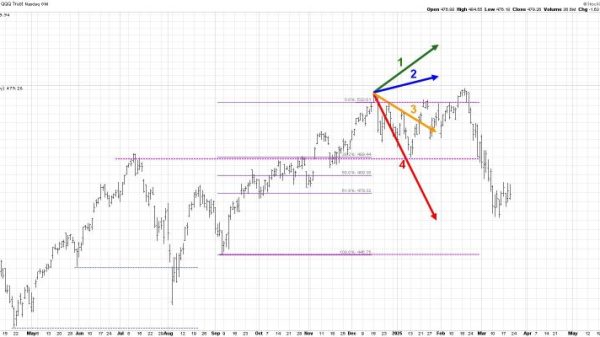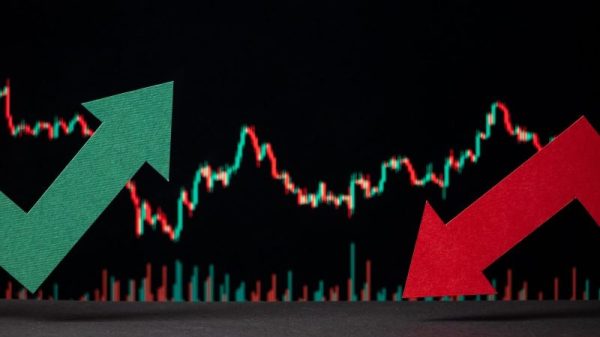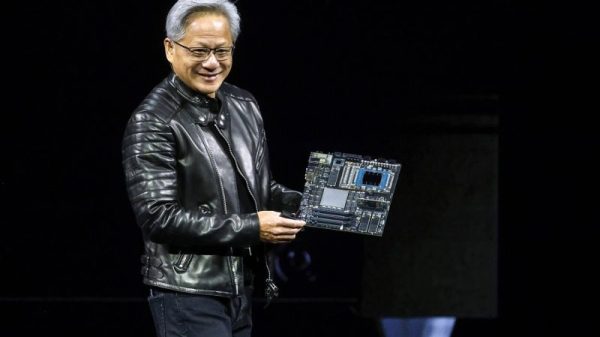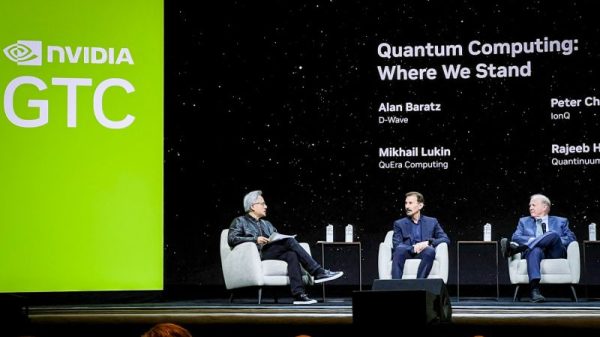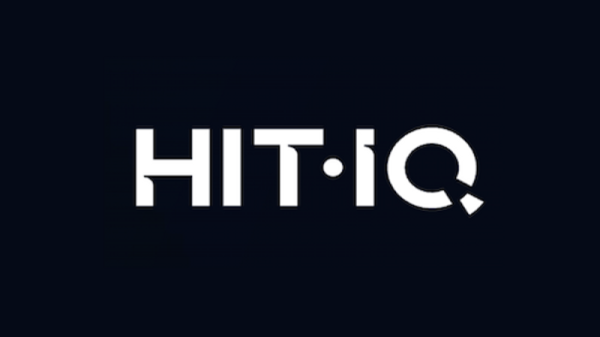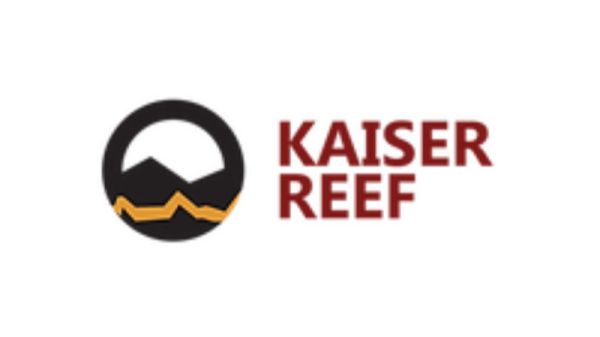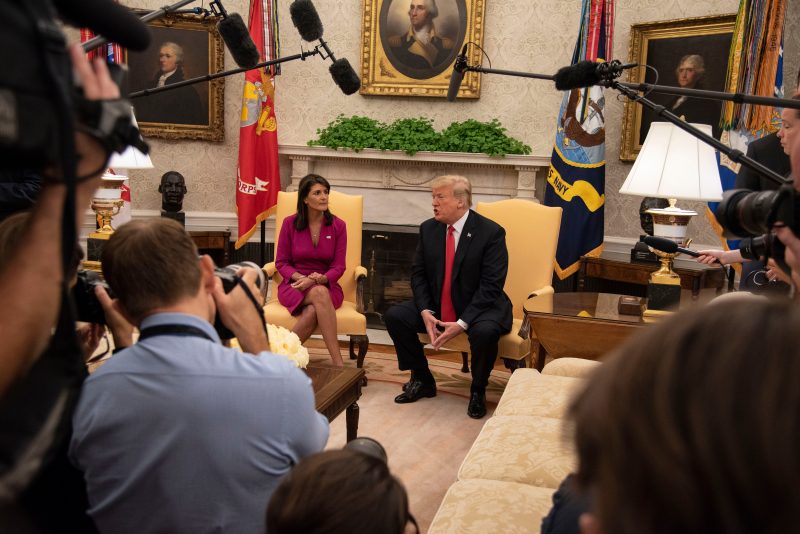As President Donald Trump listened inside the Oval Office, Nikki Haley pitched a dramatic gambit to jump-start Middle East peace talks: Cutting off U.S. funding to a U.N. program providing critical aid to Palestinian refugees.
It was a startling idea, especially coming from the ambassador to the United Nations, who months earlier had toured a West Bank refugee camp. Trump’s chief of staff, John F. Kelly — the only other person in the Oval Office at that moment, according to Haley — rushed out to find Secretary of State Rex Tillerson, who had made clear he would oppose cutting the funds.
That left Haley with a much-sought opportunity: direct access to Trump. In the moments that followed, she successfully pushed the president toward a decision that could deplete resources for food, education and other services for millions of refugees, including the girls and young women she had recently met, and alienate the Palestinian leaders whom she once hoped to win over.
The tense meeting in early 2018, as described in Haley’s memoir and confirmed by former administration officials, highlights the extraordinary conflicts of Haley’s nearly two years spent working under Trump and more recently, her campaign against him for the 2024 Republican presidential nomination.
An examination of her time as U.N. ambassador shows that, even as she clashed with Trump on some key foreign policy views, she resisted publicly criticizing him, instead pushing for meetings and phone conversations — access that alienated her from some other White House officials. She announced abruptly in October 2018 that she would leave the job, but unlike many others in Trump’s administration, she waited years before forcefully speaking out against his presidential record.
Haley initially played down her disagreements with Trump in her memoir, and only recently has gone from praising him as tough on China to saying he showed “moral weakness” on the issue. Trump, who once effusively praised Haley, now mocks her as a “globalist.”
From the start, Haley faced an intractable problem in how to be effective as Trump’s U.N. ambassador. It was Haley’s first real experience with foreign affairs, and the first exposure to the kinds of high-stakes geopolitical decisions that presidents make — a steep learning curve for the former South Carolina governor who said she had never met an Israeli leader or traveled to the region and described herself as a “foreign policy novice.”
When she took the job, she pledged to lean into international diplomacy — an approach Trump regularly dismissed. She also promised to effect change through the U.N., though Trump and adherents of his “America First” agenda viewed the organization with scorn.
In office, Haley clashed often with some fellow members of Trump’s Cabinet, particularly Tillerson, who perceived her political ambition and access to the president as dangerous and disparaged her lack of foreign policy experience, according to White House aides who spoke on the condition of anonymity to describe private conversations. Other Trump allies, meanwhile, felt that she used her direct line to Trump to undermine his agenda.
“She was running a rogue operation,” said Peter Navarro, Trump’s former trade adviser, who has received help from the former president paying his legal bills after being convicted on contempt-of-Congress charges. “She was continually out of sync with the president.”
One year into her term as U.N. ambassador, Haley faced a stark choice: whether to keep leveraging the organization’s power to help refugees, as she’d pledged to do when taking the job, or whether to ally herself with Trump’s son-in-law and senior adviser, Jared Kushner, in pushing to cut off U.S. funding.
Her ultimate decision to work with Kushner — and in the process, embrace a hard-line stance that would anger some allies but please the president — foreshadowed her actions as a presidential candidate. She has, until recently, muted much of her criticism of Trump, mostly praised his policies and even promised to pardon him if he’s convicted in any of the four criminal cases he faces.
“There were really two Nikki Haleys at the United Nations,” said Richard Gowan, the U.N. director at International Crisis Group. “There was the Haley who did secure some striking deals like sanctions on North Korea. Then there was the Haley who took the hardest of hard lines” on issues such as aid to Palestinians and once vowed to “take names” of those who opposed her.
Her rivals from the Trump administration, some of whom are supporting the former president, say she is an internationalist who shifted her views over time out of political expediency and ambition. Her associates say they evolved as she became more disdainful about the U.N. and its role in international diplomacy after working there. Her move on Palestinian aid, in particular, foreshadowed positions that put her in step with the 2024 Republican presidential field, as well as many of the party’s key donors, in full-throated support for Israel in its war against Hamas in Gaza.
Haley declined an interview request and campaign officials declined to respond on the record to a detailed list of questions for this story. Instead, spokeswoman Olivia Perez-Cubas said in a statement: “As the world becomes less safe, we need a president with moral clarity who knows America can never be neutral in the fight against good and evil. At the U.N., Nikki was Israel’s biggest ally, the administration’s most vocal critic of Russia, and negotiated the strongest-ever set of sanctions against North Korea. That’s exactly the kind of leader we need in the White House.”
Trump also declined an interview request and his campaign did not respond to a list of questions about his relationship with Haley.
There seemed little chance during the 2016 campaign that Haley, then the governor of South Carolina, would end up in Trump’s Cabinet.
After she endorsed Florida Sen. Marco Rubio in the Republican primaries and called on Trump to release his tax returns, he lashed out on Twitter that “The people of South Carolina are embarrassed by Nikki Haley!”
Yet after Trump’s election, he considered Haley for secretary of state — an idea she rejected because of her lack of experience, telling him, “I’m not your person,” she wrote in her memoir. When he offered her the U.N. job instead, she told an intermediary: “I don’t even know what the United Nations does! All I know is everyone hates it,” she wrote.
But the idea intrigued her if she could be a policymaker, so she struck a deal: She would take the job if she was given Cabinet rank, enabling her to bypass the State Department and deal directly with Trump. The president agreed, giving her the power she wanted — and making inevitable the many battles within the administration that followed.
Haley talked with an array of experts to prepare for the role, but she later wrote that one of her most important pieces of advice came from her son, Nalin, who was then 15 years old and a foreign policy “buff.” He put together a chart split between countries that were and were not friends of the United States. The thinking behind the chart would guide her tenure.
Almost immediately, Haley confronted the competing interests of her new job and her boss’s belligerent foreign policy. The trigger was North Korea, which was expanding its nuclear weapon and ballistic missile programs and violating U.N. sanctions, leading to Trump threatening Kim Jong Un, the leader he called “rocket man.”
Haley set out to gain international support for new sanctions, which required support from China, North Korea’s largest trading partner. But Trump had repeatedly attacked China during the 2016 campaign, saying that “We can’t continue to allow China to rape our country.”
There was “a very ominous feeling that we were on the verge of war between North Korea and the United States,” said Jeffrey Feltman, who was the U.N.’s under-secretary-general for political affairs at the time.
On the advice from Henry Kissinger, the former secretary of state who died last year, Haley told Beijing officials that they should fear a collapse of the Kim regime would lead to a flood of refugees, she wrote. In the end, Haley not only got China to support the sanctions, but also gained support from Russia, which could have vetoed the measure. The August 2017 vote by the Security Council was unanimous.
Feltman, who is critical of some of Haley’s other actions, said she “very effectively seized the opportunity” that opened up due to the “fear and the desire of other Security Council members to prevent a war in order to build a coalition” to impose sanctions.
When Haley visited the Middle East in June 2017, she met with Israeli leaders and also visited the Aida refugee camp, home to some 7,000 Palestinians on the West Bank near Jerusalem. As she navigated the camp’s warren of densely packed buildings, 17-year-old Rayan Abusrour waited to meet her.
“I was told that there was someone from the U.S., a very important person, who is here to actually listen to women and girls and their needs and their future and the plans,” said Abusrour, a second-generation refugee, in an interview with The Post. Abusrour recalled thinking that “Maybe there will be an actual hope for our voice to reach the international community.”
But the visit put Haley in a precarious position with the White House, where some Trump aides were already angry at her for visiting a Syrian refugee camp in Jordan a few weeks earlier. At that time, the president was meeting Saudi leaders in their palatial estates — creating a jarring split screen that Trump’s aides feared diverted attention from his visit and caught the president off guard, the aides said.
In a television interview, Haley had also suggested during her visit to the camp in Jordan that Syrian president Bashar al-Assad needed to be removed — a regime change Trump did not support. While Haley had fought against allowing Syrian refugees to move to South Carolina as governor, she also had said she wanted to use her U.N. position to help refugees wherever she could, arguing that as the daughter of Indian immigrants she has natural empathy for their plight. Indeed, she had stressed at the camp for Syrian refugees that the United States was “the number one donor here through this crisis … we’re not going to stop funding this.”
Now, Haley was again meeting with refugees — Palestinians who depended on money from the United Nations Relief and Works Agency for Palestine Refugees in the Near East, known as UNRWA, for basic services. The United States provided more than $300 million per year to the agency, making it the world’s top donor.
Inside the White House, where Trump often raged against refugees coming to the United States or supplying them with financial support, some were suspicious of Haley’s motives in visiting the camps.
“On the refugees, she wanted to cut deals to get along at the U.N. with American taxpayer dollars and Trump was just not on that page,” Navarro said.
During the meeting at West Bank camp, Abusrour said she told Haley that “my dreams would never come true unless I live in a free Palestine where there is equality and where my right of return and self-determination is actually obtained.”
Haley didn’t directly respond, Abusrour said, but later posted on Facebook a smiling picture of herself with her arm around Abusrour, along with two other girls, writing: “This morning we visited an UNRWA refugee camp & had the chance to talk with girls & women about their lives, their hopes, & their dreams.”
Six months into her term, Haley’s U.N. refugee work had won her plaudits from more liberal groups, and her willingness to take on dictators in Syria and North Korea had won accolades from hawks. Gowan, the International Crisis Group official, said Haley seemed at the time like a “towering pillar of competence compared to other characters knocking around the Trump administration.”
But behind the scenes, her clashes with Trump’s Cabinet — especially Tillerson — were growing intense.
In August 2017, Haley flew to Trump’s golf resort in New Jersey, hoping to convince him to back out of the Iran nuclear deal that had been brokered by President Barack Obama. Instead, she found Tillerson was already there. The two squared off in front of the president in a cottage near the pool, with Tillerson telling Haley, “You need to stay out of this,” according to Haley’s memoir. Haley, who wrote that Tillerson opposed withdrawing from the deal, flew weeks later to Vienna for talks at the International Atomic Energy Agency and then gave a speech in D.C. laying out the case for withdrawal.
Trump later told John Bolton, who in 2018 would become national security adviser, that he had witnessed an extraordinary scene between Haley and Tillerson. After one clash, the secretary of state told her, “Don’t ever talk to me that way again. You’re nothing but a c—, and don’t ever forget it,” according to Bolton’s memoir. Bolton wrote that he couldn’t be certain whether Trump was accurately quoting Tillerson in using the gendered slur, an anecdote Trump has repeated again to top aides in recent weeks. (Two former administration officials said they doubted Tillerson would use the term.)
Haley, who during her tenure dismissed reports of a tense relationship with the secretary of state as “so ridiculous,” said in her memoir that they were not so ridiculous after all and described her feuds with a man she called “arrogant and condescending.” Tillerson did not respond to a request for comment.
On the morning of Jan. 11, 2018, seven months after Haley’s West Bank camp visit, Kushner emailed her and other top officials. He argued that it was worth it to “strategically risk breaking things” — including the long-standing U.S. funding of Palestinian aid — to enhance the chance for a peace plan, according a memo first reported by Foreign Policy.
Kushner, who was developing his “Abraham Accords” plan to broker deals between Arab nations and Israel, wrote in his email that it was “very important” to “disrupt UNRWA,” citing an opinion article in the Wall Street Journal that recommended the strategy to put pressure on Palestinian leaders.
“Curious what Ambassador Haley thinks …” Kushner wrote.
The note hit Haley’s inbox at a critical moment. She’d begun shifting her approach at the U.N. by fighting for divisive actions backed by Trump, including his decision to move the U.S. Embassy in Israel to Jerusalem. Haley warned that she was “taking names” of the 128 countries that voted to condemn that move.
Now she had a key decision to make: whether to side with Tillerson, who feared a spiraling crisis in the West Bank and Gaza Strip, or to back Kushner on cutting funding to exert pressure — a tactic that she’d seemed to oppose in her confirmation hearings, describing it as the “slash and burn of the U.N.”
Haley not only sided with Kushner, whom she later called the administration’s “hidden genius,” but also became the chief advocate for the policy — and took the case directly to Trump, leading to the meeting with him and Kelly, the chief of staff.
Kelly, who declined to comment, had often made it clear that his job was to make sure Trump heard from all relevant advisers. In this case, with major foreign policy ramifications, he left the office to summon Tillerson. But before the secretary of state arrived, Haley wrote, she “convinced the president” that her proposal would force other countries to contribute to the program instead — an argument that appealed to Trump.
Tillerson was appalled, telling Trump that Haley’s proposal would lead to “riots in the streets,” the closure of schools, the anger of Arab nations, and harm the peace process, according to Haley’s memoir and former administration officials.
Haley has said she pushed Trump to stop funding the program because she had grown concerned about UNRWA corruption and believed the cut was necessary to protect Israeli interests. But to Navarro, it was a move of political convenience, putting her in line with Trump’s view.
Trump initially was reluctant to pick sides, and a compromise was announced on Jan. 16, 2018. Tillerson invoked his authority to supply half of a planned $120 million payment due that month to UNRWA, but his deal was short-lived; the annual funding of roughly $320 million was eliminated during the last two years of the Trump administration.
Israeli Prime Minister Benjamin Netanyahu hailed the action, calling it a “very welcome and important change.”
In her memoir, Haley wrote that the U.N. funding had encouraged multiple generations of Palestinians to be dependent on handouts and hampered peace talks. But Haley’s move dashed hopes among some Palestinians.
“You sit with me,” said Abusrour, of her feelings when she learned months later that Haley had pushed to cut funds to her camp. “You have the audacity to listen to my dreams. And still you supported the cut of funding and the limitation of funding for the agency that is helping me.”
Meanwhile, Haley’s clashes with Tillerson over a vital national-security interest were reaching a climax — as was her push to maintain access to Trump.
In March 2018, Trump fired Tillerson — and speculation erupted over whether Haley would replace him, according to several former administration officials. Instead, Trump moved his CIA director, Mike Pompeo, into the top job at State, and replaced national security adviser H.R. McMaster with Bolton.
One of Haley’s biggest critics was now gone — but it didn’t turn down the temperature in the Cabinet Room. Bolton and Pompeo would later accuse Haley of ignoring the normal process for foreign policy decisions and dealing directly with Trump. Those internal battles spilled into public view the next month, when Haley said on CBS’s “Face the Nation” that the United States was about to impose sanctions on Russia due to its support for al-Assad. Two days later, White House economic adviser Larry Kudlow told reporters that Haley may have had “some momentary confusion,” saying that additional sanctions “have not been determined.”
Haley was livid. “With all due respect, I don’t get confused,” she said on Fox News, prompting Kudlow to apologize. Haley viewed the episode as a signature moment and used her comment as the title of her memoir, “With All Due Respect.”
But Bolton in his memoir wrote that Trump considered Haley’s comment to be a misstep and asked what he was doing to fix it. Bolton wrote that he told the Russians that Haley “had made an honest mistake.” He concluded Haley was “a free electron, which she had obviously gotten used to, communicating directly with Trump.”
Haley got access to Trump by reminding officials that “she was a Cabinet member and didn’t have to coordinate with the secretary of state or the National Security Council, and she was told, yes, you should, it’s just a good way to run this business,” said a former administration official, who like several others spoke on the condition of anonymity to describe confidential interactions.
Trump and Haley’s most persistent point of tension was over the president’s deep admiration for Russian President Vladimir Putin.
That disagreement boiled over when Trump said during a July 2018 meeting in Helsinki that he didn’t “see any reason” to doubt Putin’s statement that his country did not try to interfere in the 2016 presidential campaign, contradicting an assessment by U.S. intelligence agencies.
For months, Haley had been attacking Putin over his support of al-Assad, among other issues. And, as for Trump’s assertion in Helsinki, she later wrote, “The truth was that the Russians did meddle in our elections.”
After watching Trump’s news conference, she later wrote in her memoir that she demanded to meet with the president. She told Trump that his words “made me very uncomfortable. The Russians aren’t our friends. They will never be our friends. And you made it sound like we were beholden to them.” By Haley’s account, Trump “to his credit” respected her view and “saying he had misspoken,” accepted the finding of intelligence agencies that Russia had tried to manipulate the election.
While Haley has said that she worked out her differences about Russia with Trump, a former administration official familiar with these interactions said that Haley was unable to change the president’s mind. To the contrary, this official said Trump was “angry because he didn’t like criticism of Putin. He really did think Putin was his friend.” (The official, who did not agree with Trump’s assessment, spoke on the condition of anonymity to discuss a private conversation.)
Trump continues today to dismiss what he calls the “Russia hoax.”
Haley’s ability to go directly to Trump was now being squeezed in several directions, most notably by Bolton and Pompeo. Bolton, who had helped Haley prepare for her nomination, believed she “had no qualifications for the job,” he later wrote, surmising that she had taken it to “check the ‘foreign policy’ box” in preparation for a presidential bid.
Pompeo, in his memoir, “Never Give An Inch,” was equally dismissive, writing that while he applauded her work on North Korea sanctions and support for Israel, she “didn’t do much else” and she “undermined our teamwork” by putting her self-interest first.
(In her memoir, Haley makes only a passing reference to Bolton, and she said she was relieved to work with Pompeo because he didn’t seek to “undermine” Trump the way she said Tillerson had done.)
Haley’s closest White House ally, Kushner, continued to be her most reliable advocate. One day, according to Pompeo in his memoir — recounting an episode he said he heard about but did not witness — Kushner brought Haley to the White House, along with his wife, Ivanka Trump, to discuss with the president the possibility of Haley replacing Vice President Mike Pence on the 2020 ballot. The discussion went nowhere.
Haley, meanwhile, had another notable success at the U.N., passing a long-stalled arms embargo against South Sudan. But it would be her last.
In October 2018, Haley stunned the White House by declaring that she would resign after the midterm elections. Pompeo was infuriated, writing later that she “flat-out threw in the towel” and her announcement was the “last thing the national security team needed at that time.”
In a joint press appearance, Haley and Trump were full of praise for each other. Before departing in December 2018, Haley stressed that she wouldn’t oppose Trump in his reelection bid, and she told the Atlantic that she looked forward to the day when she no longer has to “pick up my phone with a pit in my stomach, worried that something bad is gonna happen” and “I don’t have to be so scared of my phone.”
As Haley now seeks the presidency, she makes her Cabinet experience a cornerstone of her campaign — but has also doubled down on the disillusioned view she expressed in 2020, when she said the U.N. is “a place where dictators, murderers and thieves denounce America, and then put their hands out and demand that we pay their bills.”
She’s been far less forthcoming about her experiences working under Trump. “I don’t talk about opponents,” she said recently in New Hampshire. “I never have. I don’t think you want to hear it.”
Trump, in contrast, has not felt any restraint about lashing out at his one-time cabinet member. “She likes the globe,” Trump said recently in Iowa. “I like America first.”
As Haley has moved closer in the polls in recent weeks, she’s become less reticent to criticize her former boss, accusing him of lying about her record and amplifying attacks on his record on confronting China and Russia. Haley, who has stressed her support for arming Ukraine, said earlier this month that Trump is “getting it wrong wanting to be an isolationist” in that conflict.
But it’s also clear Haley is wary to overly advertise her foreign-centered work in the U.N. — particularly in a moment when many of the issues she devoted her tenure to solving have only worsened.
Al-Assad remains in power in Syria and that country’s refugee crisis has deepened. The U.N. says that 12 million Syrians have been forcibly displaced, making it the world’s worst such condition.
Haley had said the opening of the U.S. Embassy in Jerusalem would boost the peace process. But the embassy move and cutoff of aid to Palestinian refugees (the latter of which the Biden administration has reversed) never resulted in a deal with Palestinians in a region now aflame in the wake of the Hamas attacks on Israel and the retaliation by Israel in Gaza.
Abusrour, the refugee who met Haley, said that experience led her to abandon her dream of working for the U.N. “I lost faith in the United Nations,” said Abusrour, who now works for a local aid organization. “If I had a time machine, I would never agree to sit with Nikki Haley and talk to her.”
To some, the aid cutoff diminished the chances of reaching an accord with Palestinians, according to Ghaith Al-Omari, a former adviser to the Palestinian Authority negotiating team who is senior fellow at the Washington Institute think tank. “She was in many ways a negative force,” Al-Omari said. “Whether from a humanitarian or a regional stability point of view, defunding UNRWA was a disaster.”
Seven years after Haley told Congress that defunding the U.N. is “not something I would consider,” she told Fox News host Sean Hannity recently that if she is elected president, “we would defund the U.N. as much as possible.” She said she wanted to pull the United States out of the U.N.’s Human Rights Council, the World Health Organization and an international climate deal.
The rationale of Haley’s appointment to the job — that she could bring long-warring parties together by using U.S. influence at the U.N. — went unmentioned.
The only reason for staying at the U.N., she said, was to ensure that the United States could still veto measures it doesn’t like.
Alice Crites and Steve Hendrix contributed to this report.



